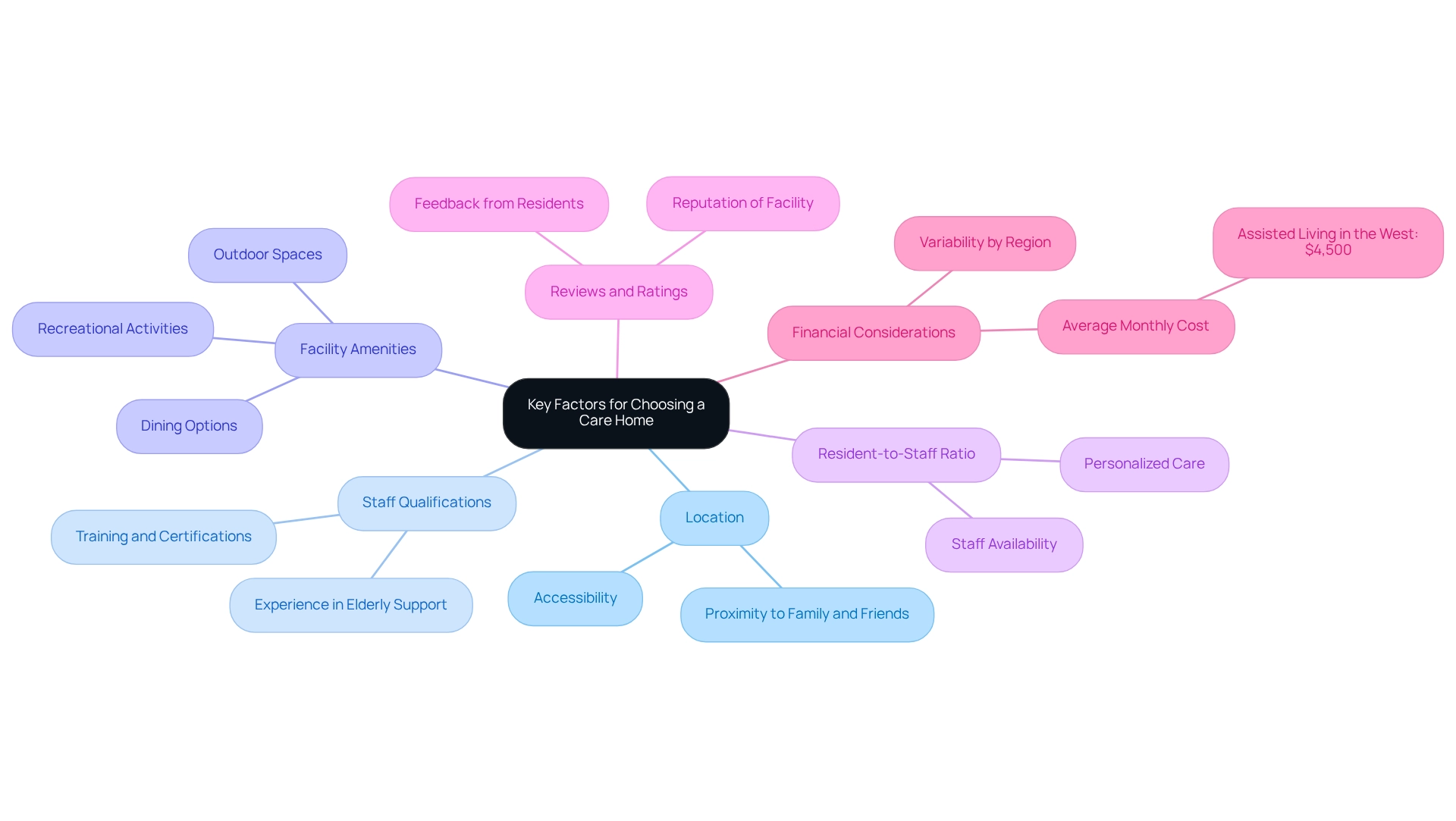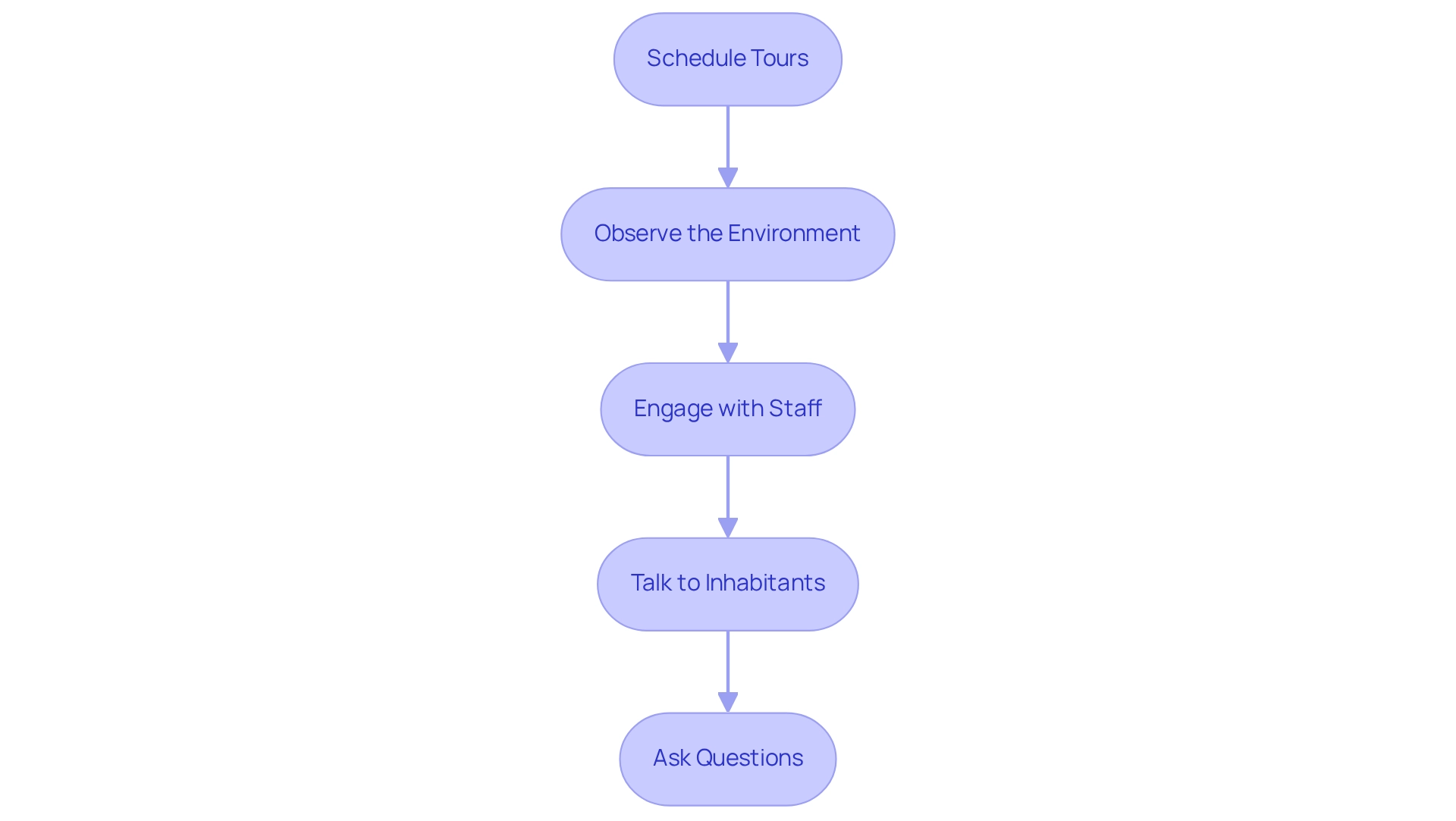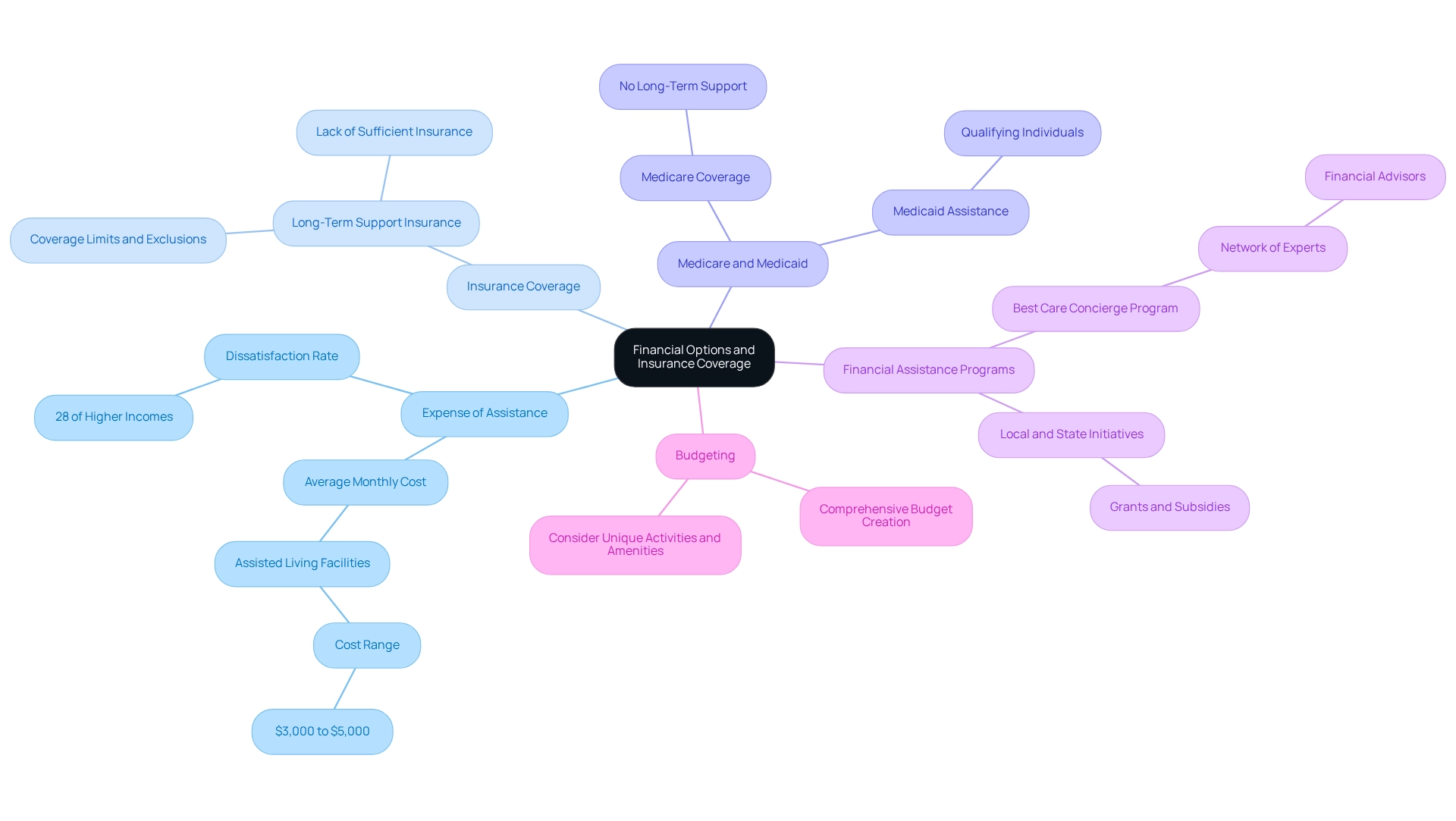Overview
Finding the best care home for your loved ones is an important journey, filled with emotions and concerns. Understanding the various types of facilities is essential, as it helps you make informed decisions that prioritize their comfort and well-being. From independent living to nursing homes, each option offers unique benefits tailored to different needs.
As you evaluate key factors, consider crucial aspects like location, staff qualifications, and financial planning. These elements are vital in ensuring that your loved ones receive the best possible care. Remember, we’re here for you, guiding you through this process with empathy and support.
In addition, it’s helpful to reflect on real experiences from others who have navigated similar paths. What questions do you have about the options available? By addressing these concerns, we can work together to find the right solution for your family.
Your comfort is our priority, and we want you to feel confident in your choices. As you explore the possibilities, know that you are not alone in this journey. Let’s take the next step together towards finding the care that truly meets your loved one’s needs.
Introduction
Choosing the right care home for an elderly loved one can feel overwhelming, filled with both emotional and practical considerations. With so many options available—from independent living to specialized memory care—understanding the distinct types of facilities is essential for making informed decisions that truly enhance seniors’ quality of life.
This article will explore:
- The various categories of care homes
- Key factors to evaluate when selecting a suitable environment
- Financial options to consider
Our goal is to provide families with the insights needed to navigate this important journey with confidence and compassion.
Understand Different Types of Care Homes
When searching for the best care home for the elderly near me, it is essential to understand the different types available and the vital role that professional caregiving plays in enhancing seniors’ health and quality of life.
Independent Living is ideal for seniors who are generally healthy and active but may need some assistance with daily activities. These facilities often promote a community environment with social events, allowing individuals to preserve their independence while enjoying companionship. However, without proper support, seniors may face risks such as health decline and social isolation. This underscores the importance of having access to CNA/HHA services that provide emotional support and household management.
Assisted Living is suitable for seniors who require help with daily tasks such as bathing, dressing, and medication management. These residences provide a balance of autonomy and assistance, ensuring that inhabitants receive essential support while still enjoying a level of independence. Professional caregivers can help mitigate risks like poor nutrition and hygiene issues, which can significantly impact overall health, while also providing companionship and emotional support.
Nursing Homes are designed for individuals with significant health issues or disabilities requiring 24-hour medical care. Nursing facilities offer skilled nursing services and rehabilitation, catering to those who require comprehensive medical attention. The presence of trained caregivers is crucial in managing medication and preventing complications from missed doses.
Memory Care facilities specialize in supporting seniors with Alzheimer’s or other forms of dementia. These homes provide organized settings and skilled personnel to assist individuals with memory-related challenges, emphasizing safety and cognitive engagement. Emotional support from caregivers can alleviate feelings of loneliness and depression, enhancing the quality of life for residents.
Recent statistics reveal that roughly 43.5 million caregivers are presently supporting their loved ones in the United States, highlighting the increasing demand for diverse support options. As the senior population continues to grow, grasping the differences between independent living, assisted living, nursing homes, and memory support becomes increasingly vital.
Insights from the CaringBridge community emphasize the significance of support and emotional connections in caregiving. These insights remind us that being present and nurturing relationships can significantly improve the quality of support offered. For instance, geriatric support specialists often promote independent living as a favored option for seniors who can manage daily tasks but benefit from social interaction and minimal assistance.
Additionally, it is important to consider the latest trends in independent living facilities, which increasingly focus on promoting wellness and community engagement among residents. Understanding the proportion of seniors in independent living compared to assisted living and nursing facilities can also provide important context for families evaluating support choices.
By familiarizing yourself with these categories and insights, you can better evaluate the specific needs of your loved one and make informed choices about their options. As Mark Twain wisely noted, “Age is an issue of mind over matter. If you don’t mind, it doesn’t matter,” reminding us of the importance of mindset in the aging process.
![]()
Evaluate Key Factors for Choosing a Care Home
When assessing a care home for the elderly near me, it’s essential to consider several key factors to ensure the best match for your loved one.
-
Location: The proximity of a nursing home to family and friends is vital for the emotional well-being of residents. Choosing a care home for the elderly near me that encourages regular visits can significantly enhance their quality of life.
-
Staff Qualifications: It’s important to investigate the qualifications and training of the staff. Caregivers should be skilled in elderly support and possess the necessary certifications. High staff qualifications are linked to improved outcomes, making this a critical factor.
-
Facility Amenities: Amenities that promote a fulfilling lifestyle—such as recreational activities, diverse dining options, and inviting outdoor spaces—should be prioritized. A friendly atmosphere can greatly influence the happiness and involvement of residents.
-
Resident-to-Staff Ratio: A lower resident-to-staff ratio typically indicates a higher level of personalized care. Inquire about the number of staff members present during different shifts to ensure that individuals receive adequate attention and support.
-
Reviews and Ratings: Conduct thorough research on online reviews and ratings from current and former residents and their families. This feedback can provide valuable insights into the facility’s reputation and the quality of services offered. Furthermore, it’s essential to consider the typical monthly expenses associated with a care home for the elderly near me, as these can vary widely by region. For example, the average monthly cost of assisted living in the West is approximately $4,500. Understanding these financial implications can help in making informed decisions.
Additionally, resources from the Florida Department of Elder Affairs can offer further support and information on various topics, including legal assistance and elder abuse prevention, enhancing the overall safety and quality of life for seniors. By carefully evaluating these factors, families can make informed choices that prioritize the well-being of their loved ones.

Visit and Assess Potential Care Homes
When visiting care homes, it’s essential to follow these steps to ensure a thorough assessment that prioritizes the well-being of your loved ones:
-
Schedule Tours: Arrange visits to multiple facilities to compare environments and services. Consider visiting at different times of the day to gain a comprehensive understanding of daily operations. Statistics indicate that families often take an average of three to five tours before making a decision, underscoring the importance of a thorough evaluation.
-
Observe the Environment: Pay careful attention to cleanliness, safety features, and the overall atmosphere. A welcoming and well-maintained environment is crucial for the comfort of inhabitants.
-
Engage with Staff: Inquire with staff members about their roles, training, and how they interact with individuals. Observe their demeanor and responsiveness to the community’s needs. Understanding the staff’s qualifications, such as whether they are CNAs or HHAs, can also provide insight into the level of assistance your loved one will receive.
-
Talk to Inhabitants: If possible, engage with current occupants about their experiences. Their insights can offer valuable information regarding the quality of care and community life.
-
Ask Questions: Prepare a list of thoughtful questions to ask during your visit, such as:
- What is the process for handling medical emergencies?
- How are activities planned for residents?
- What is the policy on family visits?
As Lao Tzu wisely stated, ‘Being profoundly cherished by someone provides you strength, while loving someone intensely grants you courage.’ This sentiment is particularly significant when selecting a residence for someone dear to you. By following these measures, you can evaluate if a facility is the right choice for your family member, ensuring their comfort and safety in a nurturing environment. Furthermore, consider the insights from the case study titled ‘Guidance for a Smooth Recovery Journey at Residence,’ which emphasizes the importance of establishing a nurturing living environment—an essential aspect when evaluating nursing facilities. Best Care serves clients in cities such as Miami, Fort Lauderdale, and Boca Raton, making it essential to locate a care home for the elderly near me that meets your loved one’s needs.

Understand Financial Options and Insurance Coverage
Navigating the financial aspects of residential facilities can feel overwhelming, and it’s important to approach this journey with care. Here are some key points to consider:
-
Expense of Assistance: It’s essential to investigate the typical charges of various types of residential facilities in South Florida, where costs can differ significantly. For instance, the average monthly cost for assisted living facilities ranges from $3,000 to $5,000, depending on location and services offered. Importantly, a survey revealed that 28% of individuals with higher incomes express dissatisfaction with the quality of services in residential facilities, underscoring the necessity of thorough research.
-
Insurance Coverage: Find out if your loved one has long-term support insurance, which may cover some or all expenses related to residential facilities. Understanding the specifics of the policy, including coverage limits and exclusions, is crucial. Statistics indicate that many seniors lack sufficient long-term support insurance, making it vital to explore this option early.
-
Medicare and Medicaid: Familiarize yourself with Medicare and Medicaid options. While Medicare generally does not cover long-term support, Medicaid can provide assistance for qualifying individuals, particularly those with limited income and resources. This support can significantly ease financial burdens for families.
-
Financial Assistance Programs: Explore local and state initiatives that offer financial support for senior services. Many communities provide resources to assist families in managing expenses, including grants and subsidies designed to support the needs of the elderly. The Best Care Concierge Program also connects families with a network of experts, including financial advisors, who can help navigate these complexities and make informed choices about their loved ones’ care.
-
It’s important to create a comprehensive budget that includes potential costs for a care home for the elderly near me, additional expenses, and any financial assistance available. This proactive approach will empower you to make informed decisions about the best support options for your loved one. Effective financial planning is crucial for managing the emotional and financial challenges associated with long-term assistance needs. Additionally, consider the unique activities and amenities offered by long-term care facilities, as these may influence your financial decisions and overall satisfaction with the care provided.

Conclusion
Understanding the intricacies of selecting the right care home is essential for ensuring the well-being of our elderly loved ones. This article has explored the various types of care homes available—independent living, assisted living, nursing homes, and memory care—each designed to cater to different needs and circumstances. By recognizing the distinct characteristics of each facility, families can make informed choices that truly enhance their loved ones’ quality of life.
When considering a care home, key factors to evaluate include:
- Location
- Staff qualifications
- Facility amenities
- Resident-to-staff ratios
- Reviews from current and former residents
These elements significantly influence the overall satisfaction and care received by residents. Furthermore, visiting potential locations allows families to assess the environment and engage with staff and residents, ensuring a well-rounded understanding of what each facility offers.
Financial considerations also play a crucial role in this decision-making process. Gaining insight into the costs associated with different care options, exploring insurance coverage, and investigating financial assistance programs can help alleviate some of the burdens families face. By creating a budget and proactively planning financially, families can navigate the complexities of long-term care with greater confidence.
In summary, the journey of selecting a care home for an elderly loved one is filled with critical decisions that impact their health and happiness. With the right information and resources at hand, families can approach this process with compassion and clarity, ultimately leading to a supportive environment that fosters dignity and independence for seniors. We’re here for you, and your comfort is our priority.
Frequently Asked Questions
What are the different types of care homes available for the elderly?
The main types of care homes for the elderly include Independent Living, Assisted Living, Nursing Homes, and Memory Care facilities.
What is Independent Living and who is it suitable for?
Independent Living is designed for seniors who are generally healthy and active but may need some assistance with daily activities. It promotes a community environment with social events, allowing individuals to maintain their independence while enjoying companionship.
What support services are important in Independent Living?
Access to CNA/HHA services is important in Independent Living to provide emotional support and household management, helping to prevent health decline and social isolation.
What does Assisted Living provide for seniors?
Assisted Living is suitable for seniors who need help with daily tasks like bathing, dressing, and medication management. It offers a balance of autonomy and assistance, ensuring residents receive essential support while maintaining a level of independence.
How do professional caregivers contribute to Assisted Living?
Professional caregivers in Assisted Living help mitigate risks such as poor nutrition and hygiene issues, provide companionship, and offer emotional support, which significantly impacts overall health.
What are Nursing Homes designed for?
Nursing Homes are intended for individuals with significant health issues or disabilities that require 24-hour medical care, offering skilled nursing services and rehabilitation.
Why are trained caregivers essential in Nursing Homes?
Trained caregivers in Nursing Homes are crucial for managing medication and preventing complications from missed doses, ensuring residents receive the medical attention they need.
What is the focus of Memory Care facilities?
Memory Care facilities specialize in supporting seniors with Alzheimer’s or other forms of dementia, providing organized settings and skilled personnel to assist with memory-related challenges while emphasizing safety and cognitive engagement.
How do caregivers impact residents in Memory Care?
Caregivers in Memory Care provide emotional support that can alleviate feelings of loneliness and depression, thereby enhancing the quality of life for residents.
Why is it important to understand the differences between care home types?
Understanding the differences between Independent Living, Assisted Living, Nursing Homes, and Memory Care is vital as the senior population grows, helping families evaluate the specific needs of their loved ones and make informed choices about their care options.











